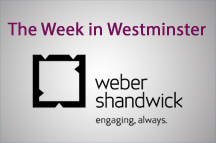 The tears were those of the Prime Minister, who spoke for the first time of her reaction on election night when the exit poll was published and the reality of her disappointment dawned. She told BBC 5 Live’s Emma Barnett that she “shed a little tear” and was consoled by her husband Phillip. The interview, revealing by Theresa May’s standards, is being credited at least in part to her newly appointed Director of Communications Robbie Gibb. Gibb, the former head of the BBC’s Westminster unit is a highly regarded and personable figure, the sort of man who will make friends for the Prime Minister where her previous advisers ruffled feathers.
The tears were those of the Prime Minister, who spoke for the first time of her reaction on election night when the exit poll was published and the reality of her disappointment dawned. She told BBC 5 Live’s Emma Barnett that she “shed a little tear” and was consoled by her husband Phillip. The interview, revealing by Theresa May’s standards, is being credited at least in part to her newly appointed Director of Communications Robbie Gibb. Gibb, the former head of the BBC’s Westminster unit is a highly regarded and personable figure, the sort of man who will make friends for the Prime Minister where her previous advisers ruffled feathers.
Other key appointments were to parliamentary select committees. These bodies have become increasingly influential since it was decided that the Chairmanships should be open to election by all MPs (previously they were subject to an undemocratic and undignified stitch-up by the party whips.) With the government so weakened, their role in shaping the tenor of political debate will become still more important, and the portents for Theresa May are not good.

She will be particularly concerned to see Nicky Morgan elected to head perhaps the most prestigious grouping of them all, the Treasury Select Committee. There has been bad blood between the Prime Minister and Morgan, a former acolyte of George Osborne, for some time - the former Education Secretary’s outspoken criticism of Theresa May’s choice of a very pricey pair of leather trousers for a Vogue photo shoot was particularly wounding. An avowed Remainer, Morgan was buoyed by the support of Labour MPs. This may have been partly down to their desire to see off her rival, Brexiteer Jacob Rees-Mogg, but doubtless more because they believe the new TSC chair will be a thorn in the side of the Prime Minister.
Tom Tugendhat, elected to chair the Foreign Affairs Select Committee after only two years in the Commons, is the very model of an up-and-coming MP. And Robert Halfon now chairs the Education Committee. Sacked inexplicably by the Prime Minister in her recent reshuffle, it will be interesting to see whether he too, might make trouble from his new position of power.
The main event of the week was the publication of the historic Repeal Bill (shorn of the “Great” moniker bestowed on it by the Prime Minister when she first laid out her plans at the Conservative Party Conference.) Debate on the Bill will begin in the Autumn, and there is every chance it will be bloody. The Prime Minister has herself invited other parties to contribute ideas, knowing that she does not have the numbers to ride roughshod over parliament. Inevitably, opposition parties are queueing up with constructive suggestions. Whereas Theresa May had originally hoped to sideline parliament through the Brexit process, now the Palace of Westminster is likely to be a determining forum for key parts of the government’s negotiating platform, still further complicating a process of already bewildering complexity.












